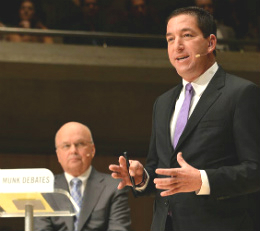"Trust me," uttered former government top spook, Michael Hayden, and immediately drew a cheerful "yeah, right" laughter from the audience. The battle of wits at the Munk Debate in Toronto on the legitimacy of state surveillance was destined to be a feisty affair.
Pulitzer winner journalist Glenn Greenwald, who publicized NSA documents leaked by Snowden, unceremoniously declared ahead of the debate that his opponents were "two of the most pernicious human beings on the planet." Alongside tech entrepreneur Alexis Ohanian, Greenwald faced off against former NSA and former CIA chief Michael Hayden and civil liberties lawyer Alan Dershowitz.
In his opening remarks, Hayden stated that intelligence techniques needed to evolve in the age when terrorists swim in our global communication grid. He laid out a convincing argument that some bulk surveillance -- as opposed to total mass surveillance -- is a necessary safeguard. He speculated that the 9/11 attacks might have been stopped had the current NSA programs been in place in 2001.
Greenwald would have none of it. According to him, bulk data collection is irredeemably invasive and dangerously indiscriminate. He cited the government's own conclusions that NSA domestic surveillance programs did not help uncover a single terrorist plot. Snowden documents brought to light the reality that NSA collected so much data that it could not properly store it, Greenwald added. As a result, the CIA was held back from sharing important intelligence with other agencies.
Those witnessing the debate likely got the impression that every time one side screamed "surveillance, surveillance" the other cried out "terrorism, terrorism." And so it went on.
At one point, the temperamentally meek yet confident Snowden appealed directly to the audience via a video broadcast, warning that current "unconstitutional dragnet surveillance" now covered phone calls, emails, web history, purchase records, "who your friends are," "where you go," "who you love" and "what you want to be."
In his closing argument, Greenwald insisted that NSA's true intent is revealed in the agency's own documents as "Collect it all. Sniff it all. Know it all. Process it all. Exploit it all." Hayden immediately countered, "NSA's mantra 'collect it all' does not mean 'collect it all.'" "What it means is they want the ability to cover any communication by any method at any time by those who would do you harm. Trust me."
To trust a powerful and secretive intelligence agency may be a hard pill to swallow for anyone. In April, after a five-year investigation, the Senate Intelligence Committee concluded that the CIA misled the government on its secret detention and coercive interrogation program. Hayden headed the agency at the time. The committee urged President Obama to make the findings public in order to ensure that this program "never happens again."
Diverse groups in England, New York City and California held various debates this year on the topic of Snowden leaks. On each occasion the spectators -- not an unlikely jury of Snowden's peers -- voted to support notions that he was a hero or that his actions were justified. This time again, in Toronto, in the final tally, the majority of people gathered in the audience (59 percent versus 41 percent) judged the current U.S. government surveillance tactics to be illegitimate.
